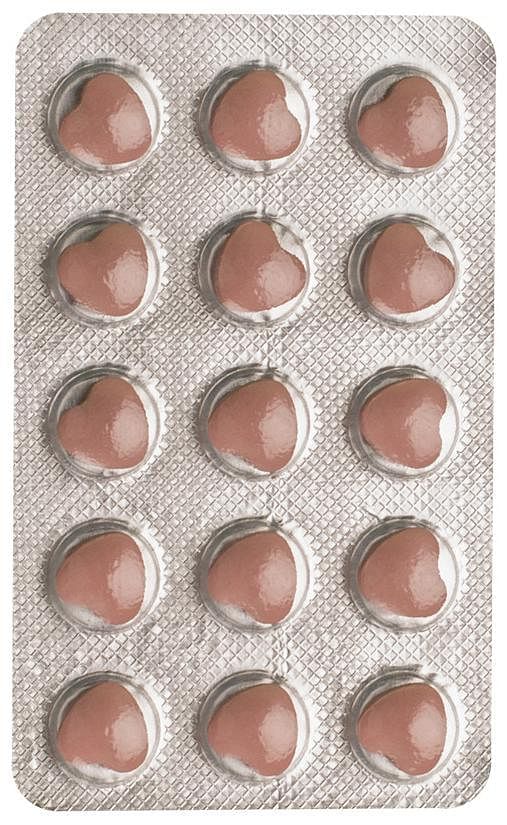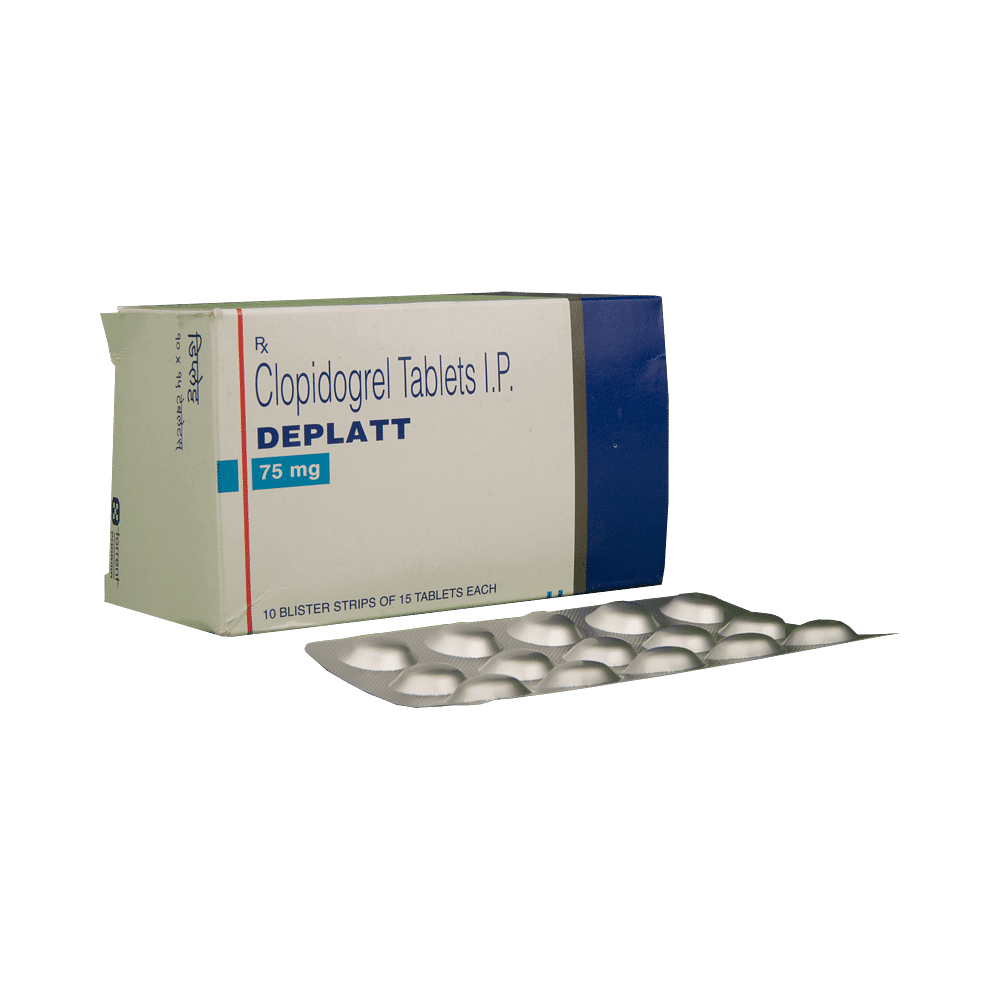
Clopitab 75 Tablet
Manufacturer
Lupin Ltd
Salt Composition
Clopidogrel (75mg)
Key Information
Short Description
Clopitab Tablet is an antiplatelet medicine or a blood thinner that helps to prevent the formation of harmful blood clots in your blood vessels, lowering the chances of heart attack or stroke.
Dosage Form
Tablet
Introduction
Clopitab Tablet is prescribed to people at high risk of heart disease, including those with peripheral vascular disease, recent heart attack or stroke, irregular heartbeats, and those who have undergone certain heart procedures. It is also used in combination with some other medicines for the treatment of heart attack and some types of heart-related chest pain. This medicine may be taken with or without food and should be taken at the same time each day.
Directions for Use
Take this medicine in the dose and duration as advised by your doctor. Swallow it as a whole. Do not chew, crush, or break it. Clopitab Tablet may be taken with or without food, but it is better to take it at a fixed time.
Safety Information
Side Effects
The most common side effect seen with this medicine is bleeding, which may be in the form of bruising, nose bleeds, blood in urine or stools, or heavier periods than usual in women.
Alcohol Warning
Caution is advised when consuming alcohol with Clopitab Tablet. Please consult your doctor.
Breastfeeding Warning
Clopitab Tablet is probably safe to use during breastfeeding. Limited human data suggests that the drug does not represent any significant risk to the baby.
Pregnancy Warning
Clopitab Tablet may be unsafe to use during pregnancy. Although there are limited studies in humans, animal studies have shown harmful effects on the developing baby. Your doctor will weigh the benefits and any potential risks before prescribing it to you. Please consult your doctor.
Interacting Medicines
Bemiparin Bupropion Dalteparin Heparin
How it works
Clopitab Tablet is an antiplatelet medication. It works by preventing platelets from sticking together, thereby decreasing the formation of harmful blood clots. This lowers the chance of heart attack or stroke.
Quick Tips
For best results, take it at the same time every day. Be careful while shaving, using sharp objects, or cutting fingernails or toenails. Do not discontinue using the medicine without consulting your doctor as this may increase your chances of having another heart attack or stroke. If you are scheduled to undergo a surgery or dental treatment, you may be asked to stop taking Clopitab Tablet temporarily.
Related Medicines

Plagerine Tablet

Clopivas-75 Tablet

Plagerine Tablet

Clavix Tablet

Clotsafe 75 mg Tablet

Plavix 75 Tablet

Clopilet Tablet

Deplatt Tablet

Ceruvin 75 Tablet

Preva 75 Tablet
Frequently asked questions
What is Clopitab Tablet used for?
Clopitab Tablet is used to prevent the formation of blood clots, thereby reducing the risk of heart attacks or strokes. It helps maintain smooth blood circulation by reducing the ability of platelets to stick together, which could otherwise lead to the formation of harmful clots in hardened blood vessels.
Is Clopitab Tablet a blood thinner?
Yes, Clopitab Tablet is an antiplatelet medication, also known as a blood thinner. It makes your blood flow more easily through your blood vessels and prevents the formation of harmful blood clots, thereby lowering your risk of heart attack or stroke.
When should you take Clopitab Tablet?
Take Clopitab Tablet exactly as prescribed by your doctor. You can take it with or without food, at any time of the day. However, it is essential to take it regularly at the same time each day for optimal results and to help you remember to take it daily.
Does Clopitab Tablet affect blood pressure?
Yes, Clopitab Tablet may occasionally cause a decrease in blood pressure as a side effect. However, this is rare and may not affect everyone. If you experience dizziness, lightheadedness, weakness, or blurred vision, consult your doctor immediately, as these are signs and symptoms of low blood pressure.
Who should not take Clopitab Tablet?
Clopitab Tablet is not recommended for individuals who are allergic to it, have severe liver disease, stomach ulcers, bleeding in the brain, or a bleeding disorder known as hemophilia, a condition in which blood does not clot normally.
Can I take alcohol with Clopitab Tablet?
Yes, you can take alcohol with Clopitab Tablet. However, excessive alcohol intake should be avoided, as it can irritate the inner lining of the stomach and increase the risk of developing stomach ulcers later.
Can Omeprazole be taken along with Clopitab Tablet?
Omeprazole (a proton pump inhibitor or PPI used to treat and prevent indigestion) may interfere with the working of Clopitab Tablet and reduce its effect. Your doctor may prescribe an alternate PPI like lansoprazole if you suffer from indigestion or if they deem it beneficial. Inform your doctor about all prescribed medications before starting Clopitab Tablet, and always consult your doctor before taking any medication.
What are the side effects of taking Clopitab Tablet?
The most common side effect of Clopitab Tablet is bleeding, which may lead to bruising on the skin, nosebleeds, blood in the urine or stools (black tarry stools), or heavier periods in females. Rarely, bleeding may also occur in the head, eyes, lungs, or joints and may be severe. If you experience minor injuries, such as small cuts while shaving, bleeding may take longer than usual to stop. Seek emergency medical help if bleeding is profuse, does not stop on its own, or bothers you. Other side effects of Clopitab Tablet that may occur occasionally in some individuals include diarrhea, abdominal pain, indigestion, or heartburn. Consult your doctor if any of these side effects persist or concern you.
What will happen if I stop taking Clopitab Tablet?
If you stop taking Clopitab Tablet suddenly, your risk of heart attack or stroke may increase. These conditions can be fatal. Do not stop taking it without consulting your doctor, as this may worsen your condition. Continue taking Clopitab Tablet for as long as your doctor has advised you to get the maximum benefit.
How long does it take Clopitab Tablet to start working? How long do I need to take it?
Clopitab Tablet starts working within 2 hours of taking it. Continue taking it as long as your doctor has advised you. You may need to take it for a few weeks or months, or you may need to take it for the rest of your life.


